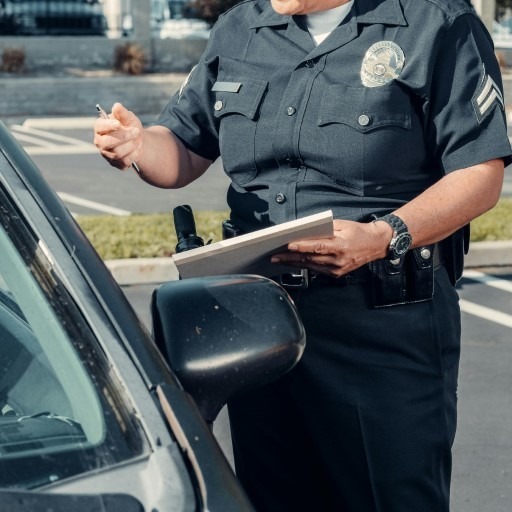Step-by-Step Guide to Becoming a Transportation Security Officer
What is a Transportation Security Officer (TSO)?

A Transportation Security Officer (TSO) is a federal employee responsible for the safety of passengers and cargo in transportation systems, particularly in airports. Their jobs include searching passengers, luggage, and cargo to prevent items that are not allowed on the plane from being transported on the flight.
To find possible threats, TSOs use several screening technologies, such as X-ray machines, metal detectors, and explosive trace detection equipment. Besides, they are also in charge of the security regulations and protocols of the Transportation Security Administration (TSA); the primary purpose of enforcing such regulations and protocols is to ensure that the safety of travelers and aviation personnel is maintained.
Learn how to Pass the Transportation Security Officer Exam with Sgt. Godoy
What are the duties of a Transportation Security Officer (TSO)?
Security Screening: Passengers, baggage, and cargo should be thoroughly screened using security equipment such as X-ray machines, metal detectors, and explosive detection systems.
Identification Verification: Verify that the passengers’ identification documents, boarding passes, and travel documents are valid and by TSA regulations, and thus confirm that they can proceed to the security checkpoints.
Prohibited Items Detection: Persons should recognize and seize banned items such as weapons, explosives, and other dangerous things to make them the reason for not allowing them to be transported on airplanes or into secure airport areas.
Compliance Enforcement: Ensure that TSA security protocols and regulations are always in force to keep airport security intact and prevent unauthorized items from entering secure areas.
Security Incident Response: Do not delay responding to security breaches, incidents, or alarms by taking the necessary security actions, working with law enforcement agencies, and helping with evacuation or emergency procedures when needed.
Passenger Assistance: The passengers are provided with aid and guidance regarding security procedures, travel requirements, and prohibited items, which helps them understand and comply with the TSA regulations.
Physical Searches: Proceed to have physical searches and inspections of individuals and items when required by the rules, and follow the accepted procedures to ensure security meets its standards and to discover threats.
Collaboration: Work with other security employees, airport staff, and law enforcement agencies to improve security measures, exchange information, and effectively address security issues.
Documentation: Keep accurate records of security incidents, fill in reports, and document any security-related issues or concerns according to the TSA rules and practices.
Training and Development: Continuous training and professional development will help you stay current and effectively perform your duties as a TSO by keeping you abreast of the latest security rules, technology, and regulations.
In general, TSOs are the mainstays of the aviation industry. They ensure safety by taking the necessary security measures, screening passengers and their luggage, and responding to incidents with professionalism and diligence.
Requirements to be a Transportation Security Officer (TSO)?

To become a Transportation Security Officer (TSO), the typical requirements include:
Education: A high school diploma or equivalent usually applies beyond that. In other cases, the employer may ask for two more years of education, either a BED or BSc or a specific field of study.
Age: Transportation Security Officers must be at least 18 years of age.
Experience: But the question arises when the given work of a person was previously in the line of security and law enforcement or aviation is the issue. Though it can be the case where the person has experience, it is not a usual scenario. Most TSO positions require on-the-job acquisition of new skills and knowledge from beginning employees, ranging from the basics of their job to understanding its essential components.
What is the testing process for getting a Transportation Security Officer (TSO) job?
The job of a Transportation Security Officer (TSO) entails several testing stages to be carried out to determine the candidate’s suitability for the job. Here’s an overview of the typical testing process:
Application Submission: Candidates typically join the TSO applicant pool by starting the process through the TSA Website or using the channels designated by the Transportation Security Administration (TSA).
Assessment Questionnaire: Candidates may request to complete an examination-oriented inquiry while screening other cases. This instrument determines whether candidates meet the basic requirements for the position.
Computer-Based Test: Candidates may be requested to sit for a computer-based test as a condition for the next stage. Through this test, the recruiting team determines candidates’ abilities and capacities applicable to the TSO role, including attention to detail, problem-solving, and customer service.
Medical Evaluation: Candidates may be required to undergo a medical examination to confirm their medical condition and ability to cope physically with the job.
Security Threat Assessment: During the security screen check portion of the TSA’s vetting process, new staff members are subjected to a security threat assessment by the TSA’s Secure Flight program.
Interview: Removable the interview; candidates who performed well in the previous step advance to subsequent selection stages. In the interview, the TSA must assess the candidate’s communication and professionalism abilities and ensure they have the right attributes to perform the TSO’s work.
Training Program: When chosen for the position, candidates are usually entered into a comprehensive TSA training program.
What types of agencies have Transportation Security Officers (TSO)?

Transportation Security Officers who work at the Transportation Security Administration (TSA) of the Department of Homeland Security are the main part of the staff. However, TSOs work in various transportation-related environments, including:
Airports: The majority of TSOs work in airports, where they are entrusted with the duty of detailing passengers, baggage, and cargo to certify that all security regulations are met.
Seaports: Other TSOs may work at seamen ports, where these specialists screen infrastructure, vessels, passengers, vehicles, and cargo.
Train Stations: In some cases, TSOs are situated at train stations and provided with functions that involve performing passenger screening at the point of boarding a train.
Bus Terminals: If required, TSOs will also be able to work at bus terminals, where they carry out security screenings for passengers who happen to be heading by bus.
Mass Transit Systems: TSOs may have the mission of providing security checkpoints for mass transit systems, such as subways, light rail systems, and commuter lines.
Federal Facilities: TSOs can be assigned to secure federal facilities, including government offices and military facilities, that employ any logistics-related security instruments.
What will disqualify someone from becoming a Transportation Security Officer (TSO)?
- Criminal History: The candidate convicted in the felony category or a serious crime can be a disqualification point.
- Drug Use: Current drug abuse or addictions, either in recent or current history of drug abuse or addiction, represent a disqualifying condition.
- Poor Credit History: More severe cases, such as loan Non-Payment or bankruptcy, may raise concerns about integrity.
- Employment Disqualifiers: Misconduct or a Board of Ethics review regarding a previous termination could affect eligibility.
- Security Clearance Issues: These positions cannot be obtained due to difficulties getting required security clearances or certifications.
- False Information: Supplying inappropriate content on the application/during the hiring interview.
- Failure to Meet Minimum Requirements: Not fulfilling the minimum age, education, and professional experience as TSA specifications.
- Legal Restrictions: Employees barred from working due to age restrictions or finding themselves ineligible due to delivery of justice or immigration status cannot be allowed to work.
- Mental Health Issues: The job performance embrace of some mental illnesses may be a barrier to job security or be a risk to public safety.
- Prior TSA Employment Issues: A previous job with TSA in the same position that resulted in disciplinary action or sacking may affect the applicant’s eligibility for reemployment.
- Sticking to the truth is crucial: Don’t provide inaccurate information or conceal ineligible circumstances because the future discovery of such facts or the termination of a job is likely to follow.
What is the pay for a Transportation Security Officer (TSO)?

TSOs’ pay changes based on where they work, their experience level, or their specific job responsibilities. Nonetheless, as a rule, the compensation of TSOs is defined by a regulatory body or federation if we refer to a bigger community.
The Pay of an entrance-level Detention Officer in 2022 is around $30,000 to $40,000 annually. Experienced TSOs may be qualified for promotion and increment in pay as they work, but they often find themselves at a dead end. Besides this, TSOs could be paid some added funds for working during the evening, night, weekend, and holiday shifts in addition to overtime. Consequently, the TSO salary may be insignificant; the benefits such as health insurance coverage, retirement plans, and paid leaves are part of the compensation for loyal workers.
What is involved in the Transportation Security Officer (TSO) Training Program?
The Transportation Security Officer (TSO) Training Program is a complex program that covers various aspects, such as knowledge, skills, and abilities necessary for performers to complete their tasks successfully. The program also targets ensuring the security of all transportation systems. Here’s what’s typically involved:
Classroom Instruction: Many classes prepare recruits on subjects such as security guidelines, entry point scanning procedures, persons of concern detection, and passenger cordiality methods. This helps joiners acquire a sound base of knowledge on which they can rely when performing their role while on duty.
Hands-on Training: TSO recruits begin their training by going through the training process, which includes supplying them with practical experience of screening equipment and related technologies, including X-ray machines, metal detectors, and explosive detection systems, among others. Through their educational training, they can operate this equipment efficiently and accurately respond to the test findings.
Simulated Exercises: During their training, recruits engage in practical drills that recreate authentic security scenarios so they can not only learn how to respond to a variety of threats, emergencies, and security incidents but also gain enhanced confidence in their ability to protect and serve.
Customer Service Training: TSOs will be trained in essential customer service skills and practices to enable them to deal with all air passengers cheerfully, respectfully, and courteously. The training underpins the fact that the owner must ensure the satisfaction of passengers when the safety rules are still held at the same time.
Legal and Ethical Considerations: The fresh recruits will be familiar with the law and ethical concerns related to their responsibility as TSOs, e.g., privacy rights, anti-discrimination acts, and privacy laws, which guide them in handling sensitive information. This training, aimed at equipping recruits with knowledge of their roles and accountability as security professionals, helps them understand that they may act on their behalf.
Emergency Response Training: The Transport Security Officers (TSOs) will receive training on the appropriate handling mechanisms for reacting to possible transportation-associated security incidences, emergencies, and critical scenarios. These procedures will cover evacuations, first aid, identification of dangerous items, and other security threats.
Communication Skills: TSOs’ being equipped with the right kind of training and their development towards improving their communication ability, such as practicing their verbal communication skills, listening extensively, and figuring out strategies to resolve conflicts effectively, complemented this process.
Procedural Training: Recruits study, practice, and adhere to the screening guidelines, protocols, and SOPs to ensure successful and consistent security operations and compliance with security regulations. During the training, these tasks are also shown as techniques to uphold procedures that will govern the maintenance of security and safety.
Regulatory Compliance: TSOs are trained in laws, regulations, and agency-governing policies that cover transportation security, such as transportation security administration (TSA) legislation and guidelines. Through this training, TSOs are educated on the legal steps and consequences they might face when committing an offense.
The Transport Security Officer Training Program provides recruits with the fundamental knowledge, skills, and competencies required to complete their duties efficiently and prevent threatening the security systems and the traveling public from any danger or adverse effects.
Learn how to Pass the Transportation Security Officer Exam with Sgt. Godoy

 Joseph Libowsky,
Joseph Libowsky,